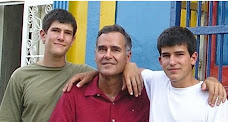We were confused, since they didn’t look like guys who just flew in from Chiapas. They were kind enough to explain, “We’re a revolutionary group in the neighborhood, and we admire the Zapatistas in Mexico, so we borrowed their name. We helped organize this fiesta.”
One of them held up a video camera: “How about a quick interview?”
They chose to focus their attention on Meredith, a young woman from Baltimore. So did a tall, slender man who had just appeared at my side, sipping his beer and staring intently. Meredith looked a little uncomfortable.
At that moment, one of the Zapatistas stepped forward and pointed to the plastic identity card that hung from the man’s belt. “This is Felipe, our sports trainer.
The card read: “Felipe Fernandez.”
Meredith suddenly broke into a wide grin and reached into her small purse. She yanked out fifteen or twenty cards, flipped through them quickly, and held one up in the air.
“Felipe!” she cried, “Look, I still have your baseball card! What are you doing here?

What was Felipe Fernandez, a pitcher who played in the national league of Cuba and was a member of the renowned Cuban national team, doing in a poor neighborhood of Caracas?
He smiled and pointed at his ID card. “I’m a sports trainer right here in this barrio.”
Meredith took a moment to explain: “Last year I went with some college friends on a Global Exchange program to study Spanish in Havana. Since we all love baseball, we attended a lot of games. Once, after an evening game in Camaguey, we drank beer and talked with Felipe. And he signed one of his baseball cards for me.”
One of the announcers from Radio Rebelde, a teenager who usually hosts a punk rock show, was excited -- “The crowd is going to love this story” – and he dragged Meredith and Felipe over to a big microphone on a card table and sat them down on two folding chairs. Radio Rebelde was broadcasting live from the fiesta.
“So, you two always seem to meet when you’re out drinking beer.” The young announcer couldn’t resist teasing Meredith and Felipe, much to the delight of the gathering crowd. His lively interview, interspersed with music and public service announcements, lasted at least half an hour.
Near the end, Felipe managed to insert a serious comment, “It’s wonderful that a Cuban and an American can meet again, right here in a country that is initiating a revolutionary process, a place where progressive people are doing things to lift up humanity instead of trying to destroy humanity.”
Felipe’s second career
As the big crowd danced and partied into the night, Felipe chatted with me I listened to a story that would be totally foreign to the kinds of athletic professionals that predominate in North America, Europe, and much of the rest of the world.
A star athlete, who had been a relief pitcher with the national team that demolished the Baltimore Orioles at Camden Yards in 1999, was nearly forty years old when he retired. He was tall, slim, and good-looking. So, what did he end up doing? Making TV ads selling shaving cream? Modeling tight-fitting T-shirts?
Not Felipe. He volunteered to live in a poor, crime-ridden barrio in South America. Minimum contract: a two-year commitment, with an option to renew. Contract pay: $200 a month. Contract accommodations: a tiny, spare bedroom in the home of a barrio family. Leisure activities: tossing balls to raggedy kids, exploring the city on the Metro, and dancing at neighborhood fiestas.
While Felipe was still playing baseball, he had begun preparing himself for a second career. For several years during the off-season, he enrolled in a rigorous university program for athletic trainers, a profession that emphasizes health and fitness education. After retiring, he worked briefly as a baseball trainer with the Camaguey team and the Cuban national team, but then took notice of a more challenging opportunity. The Cuban medical teams that were providing care for millions of poor Venezuelans wanted to sign up sports trainers to work with them.
Felipe gets to spend some of his afternoons coaching kids in baseball and basketball, but his primary duties revolve around fitness programs that are coordinated with the Barrio Adentro, the “inside the neighborhood” medical program. Every morning he leads aerobics and exercise classes for middle aged and elderly residents, many of whom have been in poor health for years. Detailed lists in each medical office show that large numbers of the older population are suffering from hypertension and poor nutrition. Emphasizing preventative medicine, Felipe and the medical team devise new exercise and nutrition regimens in their discussions with the families of those individuals who are most at risk.
The enthusiasm for physical fitness seems to be catching on with everyone. At the fiesta, Felipe introduced me to five of his “abuelitas,” a group of older ladies who meet with him every day for aerobics classes. They danced all night.
When we left the barrio that night, I asked Felipe if I could bring him anything when I returned to Venezuela. “Sure,” he said, “a baseball magazine with an article about my favorite player.”
On my next trip, unfortunately, my travel plans were disrupted and I had no time to stop in Caracas. Now it’s two and a half years later and I have no idea if Felipe renewed his contract in Venezuela, returned to Cuba, or volunteered for another medical/athletic assignment in some other country.
I still have the slightly rumpled magazine in the bottom of my suitcase. Almost the whole issue is devoted to a great pitcher from the United States, Randy Johnson. Some day I hope it will find its way to an even more admirable pitcher, a true baseball hero named Felipe Fernandez.












No comments:
Post a Comment